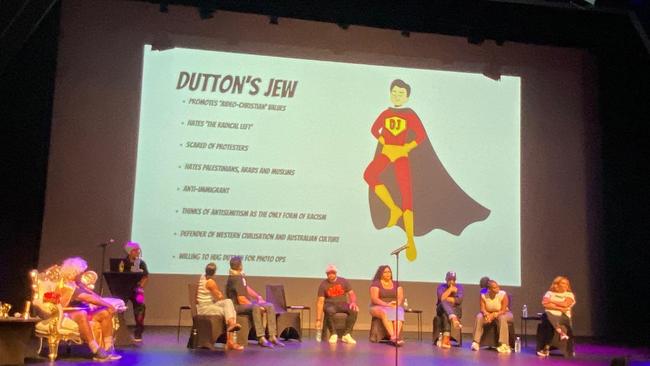QUT was warned a week before ‘anti-racism symposium’
Jewish leaders raised the alarm with the Queensland University of Technology almost a week prior to its anti-racism symposium that it could “inflame” anti-Semitism but went ahead with it nonetheless.

Jewish leaders warned the Queensland University of Technology its anti-racism symposium with a raft of anti-Israel speakers could “inflame” anti-Semitism a week before the event went ahead.
The Australian Academic Alliance Against anti-Semitism (5A) last Friday wrote to the university saying some of the speakers scheduled for the conference had “demonstrated a history of engaging in anti-Jewish racism, including spreading disinformation and disparaging stereotypes about Jews, doxxing of Jewish individuals, demonisation of the Jewish community, Holocaust inversion, and calls for the elimination of the Jewish state”.
It noted that none of its academic members were invited to speak at the conference, which billed itself as an event to “strategise a co-ordinated anti-racism agenda … while anti-Indigenous racism, Islamophobia, anti-Semitism, and anti-blackness have unique expressions, they are deeply interconnected”.
The Queensland Jewish Board of Deputies also wrote to university management and said “many of the speakers have a track record of anti-Jewish sentiment”.
The state’s peak Jewish group asked the university to make “effort to show leadership and ensure there is no hate speech at this event and no anti-Semitic rhetoric, dressed up as anti-Israel criticism”.
QUT’s deputy vice-chancellor Indigenous Australians Angela Leitch told 5A the university had taken “all reasonable steps to provide and support a culturally safe and supportive symposium for all participants, that is free from discrimination”.
“QUT has a well-developed policy framework that supports academic freedom and is committed to the protection of academic freedom and freedom of speech as essential and integral features of academic and civic life,” Ms Leitch said.
“This position applies to activities undertaken by QUT academic staff, and activities held on QUT campuses and at offsite venues.”
The QUT’s National Symposium on Unifying Anti-Racist Research and Action described itself as an event “in the lead-up to Invasion Day … to strategise a co-ordinated anti-racism agenda”, which listed controversial anti-Israel speakers including senator Lidia Thorpe, Macquarie University academic Randa Abdel-Fattah and author Sara Saleh.
Dr Abdel-Fattah has frequently been the subject of controversy since the October 7 terrorist attacks. In February last year, The Australian revealed that Dr Abdel-Fattah was one of the people who had disseminated the leaked details of hundreds of Jewish creatives.
In April, she led a “kids excursion” to the University of Sydney’s pro-Palestine encampment protest where primary school-aged children led each other in chants of “intifada” and “Israel is a terrorist state”. More recently, Dr Abdel-Fattah publicly wished for 2025 to “be the end of Israel” and for the “abolishment of the death cult of Zionism”.
Ms Saleh drew controversy in 2024 when she, while working at the Australian Human Rights Commission as a research officer, reportedly shared anti-Israel posts on social media, and then resigned following public scrutiny.
Senator Thorpe has repeatedly accused Israel of genocide and drew international headlines when she confronted King Charles during his recent trip to Australia.
When contacted for comment, a QUT spokesman told The Australian it had “received, and responded to, a range of correspondence with regard to the Carumba Institute’s National Symposium on Unifying Anti-Racist Research and Action”.
“We appreciate the differing views received but have reiterated our commitment to research and to rigorous academic discussion to address systemic racism experienced globally,” he said.
“QUT has robust policies around academic freedom and freedom of expression, but similarly on anti-discrimination and any form of racism. That includes no tolerance for hate speech.”




To join the conversation, please log in. Don't have an account? Register
Join the conversation, you are commenting as Logout